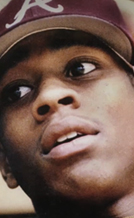Film Summary
On Valentine's Day 1993, 17-year-old Bethel High School basketball star Allen Iverson was bowling in Hampton, Va., with five high school friends. It was supposed to be an ordinary evening, but it became a night that defined Iverson's young life.A quarrel soon erupted into a brawl pitting Iverson's young black friends against a group of white patrons. The fallout from the fight and the handling of the subsequent trial landed the teenager -- considered by some the nation's best high school athlete -- in jail and sharply divided the city along racial lines.
Oscar nominee Steve James ("Hoop Dreams") returns to his hometown of Hampton, where he once played basketball, to take a personal look at this still-disputed incident and examine its impact on Iverson and the shared community.
Director's Take
When I first heard that ESPN was launching this ambitious effort, I couldn't believe it. This was not to be a typical sports series that attempted to cover all the bases of what has happened in the world of sports in the last thirty years. I love the idea that ESPN wanted to work with independent filmmakers with the goal being to make films, not just smart journalism, about subjects that the filmmakers care passionately about. That's why they responded so strongly to my idea: To go back to my hometown of Hampton and revisit a pivotal moment not just in that city's sports history, but in it's social and racial history as well.
Sixteen years ago, Allen Iverson was a junior at Bethel High School when he became involved in a racial bowling-alley brawl. That incident and the subsequent trial became Hampton's "O.J. Trial," dividing the city largely along racial lines and bringing the issue of race into the public arena for perhaps the first time in the city's history.
As a native of Hampton who grew up and played high school basketball there this story resonates for me in very personal ways. My late father was a star athlete and inductee into the Hampton Sports Hall of Fame. My mother (who still lives in the house I grew up in) became the school nurse the first year the city integrated its all black high school. ESPN really responded to the idea that I will make this something of a "first person" exploration, where I can also draw upon my own experiences of sports and race relations in the course of the film. Ultimately, I wanted to revisit what happened 16 years ago so I can learn what the lasting legacy of it is for the city's black and white communities, and for Allen Iverson himself. I hope this film can have something to say, not just about race and sports, but race and American society at this particularly crucial moment in our country's history.
http://espn.go.com/30for30/film?page=no-crossover-the-trial-of-allen-iverson






 I don't know how I aint heard about it. I was on FB and someone said they recently saw it so I assumed it just came out.
I don't know how I aint heard about it. I was on FB and someone said they recently saw it so I assumed it just came out. dude has had one interesting life for sure
dude has had one interesting life for sure he would've never went through all that if he wasn't who he was, they did my nikka wrong
he would've never went through all that if he wasn't who he was, they did my nikka wrong
